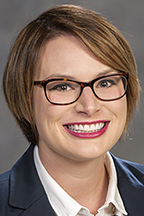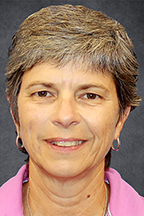Since K-12 students can’t go to their classrooms, MTSU will help provide parents with the tools to conduct a “Classroom in Your Living Room.”
The College of Education, with technical assistance from the Center for Educational Media, is producing a podcast series designed to assist parents trying to keep their children’s minds on learning during the COVID-19 pandemic.

Trisha Murphy
Trisha Murphy, the college’s development director, said she observes the professional expertise of faculty on a daily basis. She thought others would benefit from her colleagues’ knowledge while experiencing what she is with a young child at home.
“As a mother of a preschooler, I feel just a bit of the pressure parents are feeling to make sure their students are on track,” Murphy said. “I wanted the podcast conversations to reacquaint our alumni to the College of Education and MTSU while also providing much needed assistance during this time.”
The podcast can be heard weekly on Apple, Google Podcasts and Soundcloud, and, in the near future, will be heard on Spotify. The first edition was uploaded Thursday, April 2, and the podcast has drawn several hundred listeners already across the various platforms.
![]() The initial Google Podcast is available at https://tinyurl.com/whlrkx9. The Apple podcast can be found at https://tinyurl.com/rztfaha. The Soundcloud podcast can be accessed at https://tinyurl.com/w2wh8le.
The initial Google Podcast is available at https://tinyurl.com/whlrkx9. The Apple podcast can be found at https://tinyurl.com/rztfaha. The Soundcloud podcast can be accessed at https://tinyurl.com/w2wh8le.
For the newly posted second podcast, go to https://tinyurl.com/s5kpmagn for Apple, https://tinyurl.com/txvcx5h for Google and https://tinyurl.com/wjnqlu7 for Soundcloud.

Dr. Robyn Ridgley

Connie Casha
Murphy relied on Robyn Ridgley, chair of the Department of Elementary and Special Education, and Connie Casha, director of early learning programs, for tips and ideas. All three agree that, although a worldwide tragedy was the catalyst for self-quarantining, it can have positive results.
“Families should take advantage of the natural learning that happens when engaging in meaningful activities such as reading, playing games, doing chores to help the family and other activities required of all families,” Ridgley said.
While neither Ridgley nor Casha recommend a narrow focus on education to the exclusion of other aspects of life, Ridgley finds a connection between helping parents and training future schoolteachers, a goal perfectly aligned with the university’s origins in 1911 as a normal, or teacher training, school.
 “Connecting to prior experiences, modeling, providing explicit details and feedback, prompting, questioning and giving practice are used to support the learning of others,” Ridgley said. “These strategies are used when teaching or coaching families and pre-service teachers.”
“Connecting to prior experiences, modeling, providing explicit details and feedback, prompting, questioning and giving practice are used to support the learning of others,” Ridgley said. “These strategies are used when teaching or coaching families and pre-service teachers.”
Casha sees the enforced staycation as a way for parents to become closer to their kids and get to know more about their goals and aspirations.
“Recognizing families as teachers depends on families knowing what knowledge and interests their child already has and building on that knowledge and experience,” Casha said.

Dr. Kevin Krahenbuhl
Murphy, the host, talked with Ridgley and Casha as guests on the initial podcast. In the interest of social distancing, Ridgley and Casha were at their respective homes and Murphy was in her office. The second podcast features Kevin Krahenbuhl, program director of the Assessment, Learning and School Improvement Ed.D. Program, and Murphy promises other MTSU education experts as guests in future programs.
“While conversation-based, this podcast will provide listeners with actionable, practical and easily digestible tips and practices,” Murphy said.
For more information, contact Murphy at trisha.murphy@mtsu.edu; Ridgley at robyn.ridgley@mtsu.edu; and Casha at connie.casha@mtsu.edu.
— Gina Logue (gina.logue@mtsu.edu)


COMMENTS ARE OFF THIS POST